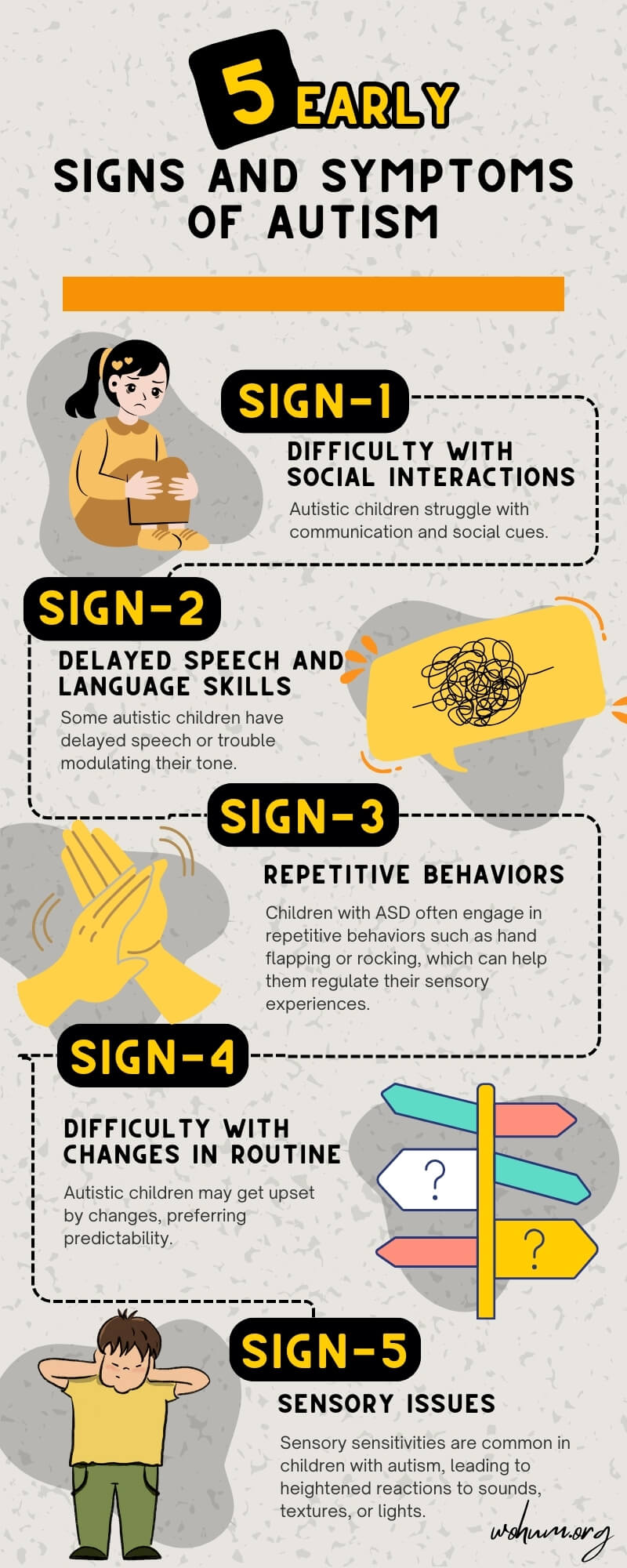Early Signs of Autism: Recognizing Symptoms and Getting Help


Autism spectrum disorder (ASD) is a developmental disorder that affects communication, behavior, and social interactions. It can be challenging for parents to recognize the early signs of autism, as some symptoms may not be apparent until later in childhood. However, early intervention is crucial in helping children with autism reach their full potential. This article will discuss the early signs of autism spectrum disorder, how it affects development, and what you can do to support your child.
Symptoms and causes can vary from child to child, but some common symptoms may indicate that your child has autism. Here are some of the early signs to look out for:
Many children with autism may have trouble in ability to communicate and interact with others. Making eye contact & facial expressions, responding to their names, or showing interest in others can be difficult. Problems with social skills can make it challenging for them to initiate and maintain conversations, understand nonverbal cues, and develop meaningful relationships.
Additionally, challenges in interpreting and responding to body language cues further contribute to their difficulties in navigating social interactions.
Children with autism may show symptoms such as delayed speech and language skills, or they may not speak at all. Modulating tone of voice effectively can be challenging for some autistic kids.
Children with ASD may engage in repetitive and stimming behaviors such as rocking, hand flapping, or spinning.
Read our related article about Stimming In Autistic Children.
Children with Autism Spectrum Disorder may become upset or anxious when there is a change in routine or environment.
Children diagnosed with autism spectrum disorder may be overly sensitive or under-sensitive to certain stimuli such as sounds, textures, or lights.
Autism can usually be diagnosed by the age of 2, though in some cases, signs may appear earlier. Pediatricians use developmental screenings during routine checkups to monitor milestones and behaviors that might indicate autism. For some children, autism may not become evident until later, as social and communication demands increase.
Early diagnosis is vital in providing the necessary support and resources to help children thrive. Identifying autism at a young age opens the door to interventions that can greatly enhance a child’s development and future potential.
Autism is primarily caused by nature (a genetic disorder), but the severity of autism can be influenced by nurture (environmental factors).
Autism is mostly something children are born with, so that’s the nature part. But how autism shows up and how strong it is can be affected by the things around you, like siblings, screen time, parenting styles and how children are taken care of. That’s the nurture or environment part. So, both nature and nurture play a role in autism.
Explore our related article If you’re willing to learn more about nature vs nurture in child development.
Autism can affect a child’s development in many ways. It can impact communication skills, social skills, and cognitive abilities. Children and adolescents with autism may have difficulty understanding and expressing emotions, forming relationships with others, and making friends. They may also need help with academic tasks like reading, writing, and math.
Recognizing the early autism symptoms holds paramount importance, as it lays the foundation for a child’s future growth and accomplishments. The significance of early intervention cannot be overstated – it’s during this critical window that a child’s brain exhibits heightened receptiveness to interventions that can alter the trajectory of their development.
By promptly identifying these indicators, parents and caregivers can proactively seek the necessary support and resources. This timely action enables the implementation of tailored therapies and strategies that nurture essential skills such as social interaction, communication, and cognitive abilities. Through early diagnosis and intervention, doors are opened to a world of possibilities that might otherwise remain inaccessible, empowering children with autism to unleash their full potential and lead enriching lives.
The Centers for Disease Control and Prevention (CDC) also emphasize the importance of early diagnosis and intervention, as they open doors to a world of possibilities that might otherwise remain inaccessible, empowering children with autism to unleash their full potential and lead enriching lives.
Early intervention is crucial for children with autism, as it can help them develop the skills they need to succeed. This may include speech therapy, occupational therapy, and behavioral therapy. It’s essential to work with a team of professionals who specialize in autism to create a personalized treatment plan for your child.
Related Reading: Understanding Autism: Can It Be Prevented Before Pregnancy?
If you suspect that your child may have autism, it’s important to seek help as soon as possible. Early diagnosis and intervention can significantly impact your child’s development. Here are some steps you can take to support your child:
Talk to your child’s pediatrician: If you notice any early signs of autism, talk to your child’s pediatrician. They can refer you to a specialist who can diagnose and treat autism.
Get a diagnosis: A diagnosis of autism can help you understand your child’s strengths and challenges and create a personalized treatment plan.
Find a team of professionals: Work with professionals who specialize in autism, such as speech therapists, occupational therapists, play therapists and behavioral therapists.
Create a supportive environment: Create a supportive environment for your child at home and school. This may include making accommodations for sensory issues, providing a predictable routine, and finding ways to support your child’s social skills.

Here are the tips for parents by “The American Psychiatric Association.“
When you have a child with autism, it influences everyone in the household. It often proves stressful, demands a lot of time, and raises costs. Attending to the physical and emotional well-being of all family members is crucial. Numerous advocacy groups, both national and local, offer advice, material, and assistance to those dealing with autism spectrum conditions and their families.

Autism, or Autism Spectrum Disorder (ASD), is a developmental disorder that affects communication, social interaction, and behavior. It is typically diagnosed in early childhood, and it is a lifelong condition.
The causes of autism are likely a mix of genetic and environmental factors. However, genetic factors play a significant role in ASD.
There’s currently no proven method for entirely preventing autism before pregnancy. However, maintaining a healthy lifestyle, which includes taking prenatal vitamins like folic acid, could potentially reduce risks associated with developmental disorders.
According to the Environmental Health Perspectives research in 2014, exposure to certain air pollutants during pregnancy could also be associated with an increased risk of autism.
Also Read: Understanding Autism: Can It Be Prevented Before Pregnancy?
Early puberty is not considered a sign of autism. ASD often involves challenges with social interaction, communication, and repetitive behaviors. Usually, signs of autism spectrum disorder begin to appear in early childhood. The severity of symptoms can vary across various age groups.
Symptoms associated with autism don’t necessarily worsen over time; rather, they can change or evolve with age. Interventions and support can often help improve skills and adaptability.
The early signs and symptoms of (ASD) Autism can vary widely from child to child, but some common indicators include delayed or absent speech, difficulty with social interaction, repetitive or stereotyped behaviors, and a lack of interest in playing with others or in typical play activities. Other signs may include sensitivity to certain stimuli, such as loud noises or bright lights, and a tendency to engage in self-stimulatory behaviors, such as hand flapping or rocking.
Autism can be diagnosed as early as 18 months of age, although it is often diagnosed later. The American Academy of Pediatrics recommends that all children be screened for Autism at 18 and 24 months of age. Early diagnosis before the age 2 has crucial effects on children’s development.
Autism is typically diagnosed through a combination of observation, developmental screening, and comprehensive diagnostic evaluation. Parents, caregivers, and healthcare professionals may all be involved in the diagnosis process.
While there is no cure for Autism, early treatments for children can greatly improve outcomes for individuals with the disorder. Treatment may include behavioral therapy, speech therapy, occupational therapy, and medication. These treatments can make a big difference in the children’s next years of life.
If you suspect that your child may have autism spectrum disorder, it is important to talk to your child’s healthcare provider as soon as possible. They can help guide you through the diagnosis process and connect you with resources and support. Early intervention is key to improving outcomes for children with Autism.
Covering ears could indicate sensitivity to noise, often seen in kids with Autism. Yet, covering ears alone is not a sign of Autism. Sensory issues exist in various conditions. Please explore other signs of Autism we’ve discussed. For a definitive diagnosis, consult a healthcare provider for evaluations and tests.
Recognizing the early signs of autism is crucial for helping children with autism reach their full potential. If you suspect your child may have autism, it’s essential to seek help from a specialist who can diagnose and treat autism. Early intervention is vital in helping children with autism develop the skills they need to succeed.
As a parent, it can be challenging to come to terms with a diagnosis of autism, but it’s important to remember that your child is still the person they were before the diagnosis. With the proper support and treatment, children with autism can lead fulfilling lives and reach their full potential.
Creating a supportive environment for your child at home and school is important. This may include making accommodations for sensory issues, providing a predictable routine, and finding ways to support your child’s social skills. Work with a team of professionals who specialize in autism, such as speech therapists, occupational therapists, and behavioral therapists, to create a personalized treatment plan for your child.
Recognizing the early signs of autism and seeking help is crucial for helping children with autism develop the skills they need to succeed. With the proper support and treatment, children with autism can lead fulfilling lives and reach their full potential. If you suspect your child may have autism, talk to your child’s pediatrician and seek a diagnosis from a specialist. Remember, you are not alone in this journey; resources and support are available to help you and your child.

Get Your Resources to Your Email Now!
Comments (6)
canadian pharmacy online
Pretty! This has been an extremely wonderful post. Thank you for supplying these details.
Patrick
I have just found that my son might have autism. I am so stressed, I do not even know where to start. My wife and I were mostly focusing in his speech which I thimk triggered the thought of taking him to a peadiatrician for examination. What should we do from here?? We have our own disagreements as parents and cannot find a common groung to support him
The World Humanitarian Movement
I understand that this is a challenging time for you and your family. Firstly, we recommend seeking guidance from a pediatrician for a thorough assessment. Making assumptions will only increase the stress. It’s essential to get a proper diagnosis before getting started to anything. You should communicate openly with your wife and work together to provide the best support for your son.
The condition of your son must be the priority for you.
Having a son with autism is not the end of the world neither for you nor for your son.
It will only mean that you’ll have to raise your son differently and different doesn’t mean bad.
Remember, you’re not alone, and there are resources available to help you navigate this journey. Consider researching programs provided by government or organization focuses on children with autism.
We wish you all the best
Patrick Mthimunye
Thank you so much for the words of encouragement. we will deal with it as per your advice and will take this as sensitive as possible to support our son.
mubeen
My boy aged 2.5 years was diagnosed at the age of 1.75 and due to early diagnosis. He is progressing pretty well. And our way to this was a lot of activity and started treating using activities that he likes. So as of now he learned A-Z Alphabets. Names of people around him. Greetings, solar systems. Counting from 1-20, and I can’t write them all. But during this process. And a lot of active communication is getting day by day better. He is hyperactive, so this was very hard for his mom to deal with him.
World Humanitarian Movement
Thank you so much for sharing your journey with your son! It’s great to hear about his remarkable progress at such a young age.
Early diagnosis and focusing on activities with him clearly have made a positive impact.
We wish your family all the best.